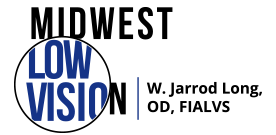Best-corrected vision (using glasses, contact lenses or refractive surgery) which is insufficient to do what you want to do.
Vision loss can occur from a variety of causes, including both medical and genetic conditions. Examples of medical conditions include: macular degeneration, diabetic retinopathy, cataracts, and glaucoma. Genetic conditions include: Stargardt’s disease, retinitis pigmentosa, and albinism. Other causes can be congenital or traumatic.
Low vision doctors are more concerned with the amount of remaining vision, not the cause of the loss itself.
A low vision exam focuses on examining vision and function, so medical tests such as dilation are usually omitted. Typically a low vision exam lasts one hour or more.
At the beginning of your appointment, we will discuss with you how your reduced vision is affecting your life. We will then create a “wish list” so Dr. Long understands what your goals are.
The second part is extensive vision testing. Careful refraction is performed to find out if a new “regular” eyeglass prescription will help.
Part three involves magnification, illumination and other optical and non-optical low vision devices. Dr. Long will work to determine the best form and level of magnification needed for the person to perform the desired tasks. Telescopes, microscopes, and prisms, with varying levels of magnification and strength, as well as other magnification devices are presented to you. Illumination levels must be determined as lighting plays a major role in vision.
The final part of your exam is another conversation to determine the best form and level of magnification for your task requirements.
Low vision doctors have been been trained in the optics, physics, and use of high-powered lenses and lens systems. They have a deep understanding of the principles of magnification, field of view, depth, and focus. In addition, they have a working knowledge of the advantages and disadvantages of the multitude of low vision glasses, magnifiers, electronic and non-optical devices available.
An important part of running a low vision practice is working with patients and families who can be extremely upset, fearful, and even depressed. Dr. Long has the patience and time to explain your eye and vision condition, and what the future may hold for you or your loved one. It is our goal to ease confusion, and help patients who have been misinformed and/or have an unrealistic view of their future.
Compassion and empathy play an important role in our practice. We will take the time to get to know what you and your family are going through, and provide you with the the knowledge, resources, and experience to help you adjust to the difficult situation. Low vision doctors know how to analyze a task according to the amount of vision, lighting, working distance and field of view needed for completion. They are experts at designing low vision glasses to meet the needs of the patient.
Dr. Long has determined that asking the right questions on the phone can determine if a patient is, or is not, qualified for low vision services. “If they ARE qualified, I am excited and hopeful for them! If they simply are not, why put the patient through the time and expense only to be disappointed? That said, I almost never turn anyone away because I’ve been surprised at who I can ABSOLUTELY HELP over the years” says Dr. Long.
During the complimentary telephone interview, the doctor will ask questions regarding vision, functional abilities, goals, motivation, health, and mobility to determine if an appointment is in the best interests of the caller.
Your regular eye doctor will recommend and prescribe specific vitamins, nutrition, and lifestyle modifications in order to slow the progression of macular degeneration.
However, if you have noticed problems with your functional vision (e.g. reading, driving, recognizing faces) then it is time to see a low vision doctor. Dr. Long prescribes a variety of special glasses and devices that can help you see if you have age-related macular degeneration or any other form of vision loss.
It typically takes two to four weeks for specialized glasses to be fabricated. Arrangements can be made to have them sooner in some circumstances. If a person has a special event coming up and needs the glasses, the lab can usually expedite the order.
During the evaluation, the patient will use actual low vision telescope, microscope and prismatic glasses on different tasks. The doctor and the patient will see that they work BEFORE they are ordered. This will be done again when the patient picks up the glasses. We never order glasses until the patient knows that they work.
Almost always, prescriptions and magnification levels can be changed without the need for a whole new pair of glasses. We offer a 12-month warranty if the prescription changes at no charge to the patient. It is interesting that changes are actually rarely needed.
